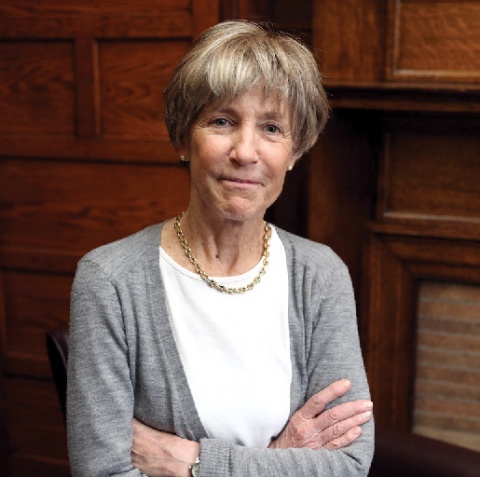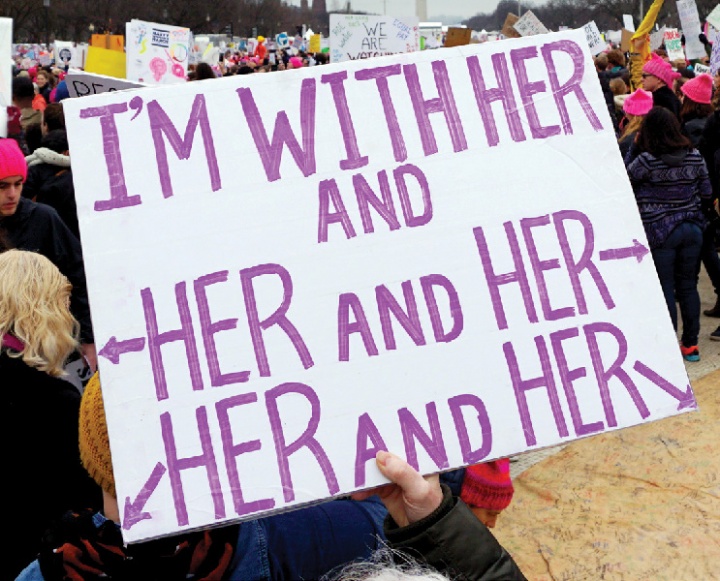History professor Martha Howell GSAS’79 discusses gender inequality, feminism and how the Women’s Marches have energized the movement.
Columbia College | Columbia University in the City of New York
History professor Martha Howell GSAS’79 discusses gender inequality, feminism and how the Women’s Marches have energized the movement.

Millions turned out on January 21, 2017 for Women’s Marches around the world.
Brian Allen / Voice of American Wikipedia Commons
CCT: We published an interview with you in the November/December 2010 issue in which you said that when you grew up in the 1960s, the only careers imaginable for a woman, other than being a mother, were being a teacher, a nurse or a secretary. How did it look in 1987? And what about now, 30 years later?

MICHAEL DAMES
And yet, take a look at senior management in big corporations. There are not that many women, even though in 1987 it was possible for women to go to the top business schools and get the training that would have put them in a position for having these kinds of leadership roles. [Author’s note: According to Catalyst, a nonprofit that researches women in the workplace, today women make up 5.8 percent of CEOs of S&P 500 companies and 25.1 percent of executives and senior management.]
So, yes — women in 1987 had access that women in 1967 absolutely did not have. And there have been changes from 1987 to 2017, but not as dramatic as those that occurred from the ’60s to the ’80s. Things are a little better because there has been a slight improvement in the number of women at the very top.
Can you contrast the environment on campus to the outside world? The College student body is currently 51 percent female, so you’d think it’d be equal opportunity out in the world, but is it?
No, it’s not.
So in other words, the academy is ahead of the rest of society.
Yes, yes.
Do you think female students understand that?
The graduate students I teach all want to become professors and enter an academic community like this one. There’s still sexism in some ways — leadership positions are dominated by men, white men, specifically, and there are still disciplines that have an unacknowledged and unintended, largely, bias against hiring women — but there’s still terrific access,
particularly in humanities and social sciences such as history and anthropology. So I think my female graduate students are looking at a world that will welcome them.
I think women in business school are more aware of what the barriers will be when they get out in the work world — much lower barriers than there used to be, but there are still barriers.
The students who are most innocent of all this tend to be my female undergraduates. They’ve lived in a world that tries to be gender-neutral. They’re sitting in class with men, and most of the time they feel empowered and equal.
But what they don’t understand is when they get into the working world and real life hits, the gender system is firmly in place. And if they marry and have children, that’s when it really, really hits, because it’s almost impossible to have a high-powered professional life and be a mother. There are some circumstances in which you can do it; one of them is when you hire people to help care for the children. It’s a balancing act and crazy, but it’s one way to manage what is a complicated arrangement.

The assumption is that the person who does most of the parenting is the female. Men are not expected to make the arrangements and adjustments that women are expected to. So, one of the things that could happen is the way work is organized could change. The other thing is the gender system could be altered so that men take more responsibility for parenting. There has been progress in that realm in my lifetime; however, it is still not equal — far from it.
What could the College be doing to help?
I think Columbia should work harder to put women in leadership positions. I think ways that show how gender hierarchy plays out in life should be talked about more. The discussion of gender needs to be distributed throughout the curriculum rather than segregated in classes revolving around gender specifically.
Could the Core Curriculum take better account of gender?
There have been many efforts to revise the Core to take better account of gender, but yes, more could be done. Reading lists could be reorganized. I think everyone should read Locke, Marx and Aristotle, but they should be taught and read with a much clearer focus on the ways they depend on gender hierarchy and on heterosexist hierarchy. Those issues are easy to pull out of those texts, and when I teach the texts I try to do that. There’s too much of an assumption that these are classical truths that endure through time. They’re not interrogated from the point of view of the hierarchies that we experience in our world.
“There’s sexism embedded in our culture and I don’t know when the time will come when the United States is ready to accept a woman as head of state.”
Speaking of our world, where do you think we stand in terms of women taking leadership roles in government? Are we ready for a female President?
That’s a tough call. The United States is the most powerful country in the world, and I think that role carries more weight than a comparable office in other parts of the world. It’s a harder call for the country to accept that a woman can shoulder that burden. Hillary Clinton had her own problems as a candidate but I still think there was an element of, “Is this the right job for a woman?” There’s sexism embedded in our culture and I don’t know when the time will come when the United States is ready to accept a woman as head of state. I think it will, eventually, but what’s going to have to happen is we’re going to have to have a bigger stable of women in the Senate, in governorships, in places like that. Women generals: There are some, but there’s still more work to be done for it to be seen as normal.
“Feminism” is a fraught word in American culture.What did Clinton’s run for the presidency teach us about feminism? In what way?
There were contradictions inherent in second-wave feminism, in the ’70s and into the ’80s. The big one is that it was a white, middle-class women’s movement. It didn’t consciously exclude — but it didn’t effectively consider — poor women, black women, immigrant women and so on. So much of the political action was organized around access to jobs, to political rights, to reorganization of the marital household and to challenging conventional notions of female gender roles, and a lot of those issues were not the issues of working class, poor or black women. So feminism as it was conceived in the ’70s and much of the ’80s was never able to speak for all women.
I have two nieces who are getting their Ph.D.s. A few years ago one of them told me she’s not a feminist. And I said, “What?!” Boy, did I let her have it! “You are in a Ph.D. program because of the women who came before you who were feminists.” She was so sorry, poor thing.
The feminist movement is definitely complex, but do you think it is evolving?
In the beginning, I was completely unaware of how incomplete the women’s movement was — and in some cases inappropriate — for lots of women in the United States, let alone the rest of the world. I don’t think we’ve found the narrative that can satisfy all women in all situations.
But I do think that there’s a greater realization that there are many, many ways in which gender subordination — you can call it discrimination, you can call it patriarchy — unifies women. And what we need, I think, are better ways to organize around these different aspects and to find common ground in being women and yet a way to acknowledge that all women are not alike.
We share our femininity, but that doesn’t mean that we share aspirations, life chances, social circumstances, sexual preference, so it’s very complicated. But no, the women’s movement is not dead, but it’s both more general and more specific.
I am talking to a lot of people about the present political moment in the United States, and a lot of women are organizing around issues that are not gender issues. They are nevertheless organizing as women, as politicized women. And yes, a lot of what they’re organizing around is particular to women, such as reproductive rights, but also generally progressive politics, about economic equality, about racism, about xenophobia and so forth. It’s locating the issues that affect women in a larger terrain of political and social injustice.

MARY MADIGAN / WIKIMEDIA COMMONS
They were terrific! I marched in New York. I thought they were both a protest by women about the threats to women’s rights that are posed by the Trump administration and also, more generally, marchers were outraged by what Trump stands for on many levels and that’s really what energized them, as much as any specific, identifiable threat.
Do you think they were effective?
Yes. They identified fellow travelers, which is important, so that people recognize that it wasn’t just them and their small group of friends who were worried and scared and outraged. There’s going to have to be follow-up, and that includes things like calling your representative, going to town meetings, writing letters, getting in the newspaper with op-eds and things like that. Marching on the street is important, but it’s only the beginning.
On Saturday, April 22, Columbia College Women (CCW) will host its first symposium to coincide with the 30th anniversary of the graduation of the first fully coeducational class. “Celebrating 30 years of Columbia College Women” is an all-day event at which alumni and current students will have space to network, build community and reflect on the successes College women have had and the challenges they, and all women, still face. More than 20 speakers will discuss topics such as the media’s portrayal of women; how to create a successful, inclusive feminist movement; and how best to develop today’s young women into tomorrow’s leaders.
The morning keynote, “Girls Who Thrive,” will feature two University trustees: reporter and author Claire Shipman ’86, SIPA’94 and independent school head Wanda M. Holland Greene ’89, TC’91.
Holland Greene helms The Hamlin School, an all-girls school in San Francisco where students are taught to overcome inequities and challenge societal biases toward women. She spoke to Columbia College Today about her time at the College in the early coeducational years and shared her thoughts on the goals of coeducation:
“As a proud alumna of an extraordinary all-girls school in New York City, I was purposeful in choosing to attend the College because I knew that strong, smart and confident women would be key to the long-term success of coeducation,” she says. “Women like me didn’t just arrive — we showed up! We entered the Gates on College Walk with deep intellectual curiosity and the boldness to speak and lead, and we never looked back.
“The ongoing work at the University as a whole and at the College in particular is to ensure that women thrive at Columbia, not simply attend classes, eat in the dining halls and live in the dorms. Coeducation was not an endpoint,” she says. “It was the beginning of an essential conversation about equity and inclusion, and I look forward to a robust dialogue with Claire about the challenges and opportunities that women face and embrace in the decades since coeducation. We cannot assume that because women are present their issues are embraced and understood.”
Lilly Burns ’09, VP and head of development at Jax Media and the executive producer of the hit TV comedy Search Party, will co-lead a discussion on “Authenticity as Art” with designer Selby Drummond ’09.
The discussion will suggest that women who display their true selves with confidence, brains and humor often exercise the most powerful form of feminism.
For Burns, “The best part of being at Columbia was the level of intelligence of the whole student body. I just wanted to hear everybody talk,” she says. As a more recent alumna, Burns says she accepted coeducation as the norm. “I never thought about it because I had never experienced anything else,” she says. “I took for granted that it had always been that way.”
Lea Goldman ’98, editor in chief, Lifetime Television, was at the College when coeducation was still a newer change. She offers another perspective: “Having grown up in an ultra-conservative Jewish community, Columbia was my Xanadu on the Hudson — I could not for the life of me figure out why anyone would want to attend a same-sex college. Meanwhile, I spent most of my four years in a self-imposed, back-row exile, utterly cowed by the intellectual firepower around me. It was often the guys who sat front row and parried with the professors,” Goldman says.
“Fast forward 20 years — past all those sweaty, humbling years in the workforce trying to earn a seat at the table — and I do sometimes wonder if, in an all-women’s school, I might have found it all a little bit more encouraging,” she says. “Maybe I’d have found my voice earlier, and in the process, spared myself some of the painful scrapes and bruises I earned along the way. Who knows? But I have zero regrets.”
Goldman will speak at the symposium as part of the four-person panel “Women in the News,” which will discuss how media plays a powerful role in shaping and/or reinforcing perceptions of women, their roles and their stories.
— Jill C. Shomer
Shira Boss ’93, JRN’97, SIPA’98, CCT’s contributing writer, was a freelance journalist for The Christian Science Monitor, Forbes.com and The New York Times, among other publications, and “Marketplace” on public radio. She is the author of Green with Envy: Why Keeping Up with the Joneses Is Keeping Us in Debt and runs the website Zero Cost Kids. She lives on the Upper West Side with her husband, two sons and two whippets.

Published three times a year by Columbia College for alumni, students, faculty, parents and friends.
Columbia Alumni Center
622 W. 113th St., MC 4530, 6th Fl.
New York, NY 10025
212-851-7852
cct@columbia.edu

Columbia Alumni Center
622 W. 113th St., MC 4530, 4th Fl.
New York, NY 10025
212-851-7488
ccalumni@columbia.edu